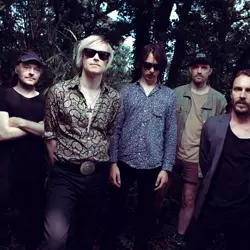 Refused
RefusedWhen Swedish hardcore band Refused disbanded in 1998 – shortly after the release of their powerhouse third album The Shape Of Punk To Come – they made it patently clear that this was the end of the line. They'd been peddling their fervent anti-capitalist polemic for seven years, but had become disillusioned by a combination of inner ideological conflict and outsider apathy (particularly from within the notoriously insular hardcore scene of the time), so when they wanted out they didn't just split up but instead issued a manifesto of sorts – one of the most resolute band dissolutions of all time.
Their “final communiqué”, 'Refused Are Fucking Dead', was a lengthy screed of revolutionary rhetoric and idealistic zealotry, including tracts such as, “We were hoping that we could be the final nail in the coffin of the rotten cadaver that is popular music...” and, perhaps most importantly, “...we will never play together again and we will never try to glorify or celebrate what was”. The band was over, and the world basically shrugged and moved on.
But the myth and legacy of Refused began to replenish, mainly because the innovative and unique sound on The Shape Of Punk To Come began to filter through to different scenes and gradually find appreciative ears, but also (perhaps ironically) because of the way they finished the band's tenure with such a definitive full-stop. A couple of years ago rumours began to abound of a reformation, but this fire was soon categorically quelled by frontman Dennis Lyxzén, who denied any such plans – but then in late-2011 the buzz was back that Refused would play Coachella 2012. This time the rumours turned out to be on the money. The band that were never coming back were back.
“It was just one of those deals where it just kind of came together,” singer and chief agitator Lyxzén explains nonchalantly. “For the first time in a long time we were all living in the same city, and Kris [Steen – guitar/bass] and David [Sandström – percussion] started playing music together again – they hadn't done that in ages, David hadn't played drums at all in ten years or something like that. So all of a sudden we're all moving in the same sort of circles and all hanging out together, and then we got the offer from Coachella and it just felt like something that we should try to do. We'd had offers from them for years – every other year they'd give us an offer – but it had always been, 'No, that's impossible,' but all of a sudden it felt possible. So we tried it out, and yeah, it could be done!”
Don't miss a beat with our FREE daily newsletter
The reunion shows in Europe and America have been incredibly well-received due to the fact that most fans were resigned to never seeing Refused in the flesh, but also because their music still sounds so vital.
“I don't know, you never know that – if you had that sort of recipe you'd just keep on doing that over and over again,” the Swedish singer laughs when asked why Refused's music has stood the test of time. “Anything like that is just a weird combination of people, time, place and a little bit of dumb luck and a little bit of talent – that's just what it is. We were lucky to create something – especially with the last record, and maybe a little bit with the record before that [1996's Songs To Fan The Flames Of Discontent] – that was very special and timeless. It happens and you never know why. We're all just trying to write good music and write good songs, but it's hard to get that special connection.”
On the subject of why Refused's mythology has grown so exponentially over time, however, Lyxzén has a far more concrete perspective. “I think one of the reasons of course is the music – there's some kick-ass songs on that last record that spoke to a lot of people, and I think we came at the right time and in the right place,” he muses. “We were kind of groundbreaking with what we did – since then a lot of bands have done similar things – but we were one of the first bands to take punk rock and hardcore to another level... without sounding too pretentious, we were that band. And I also think that the myth of Refused is something that helped. We broke up before anyone could hear that record, and we became like this mythical creature like the fucking yeti or something. Everyone had heard about it but they'd never seen it, and I think that's part of the reason why people are so excited now – a lot of people discovered us after we broke up, and were, like, 'Who are these guys? They're awesome! What do you mean they broke up? That's horrible!' They never expected to get the chance to see us, so I think that's why people are so excited. It's weird, at shows we play this pretty heavy, aggressive music and you look out into this moshpit of people smiling – it's kind of crazy.”
You'd imagine that a feeling of there being unfinished business would be emanating from the Refused camp because back in the day they didn't really get to explore the full live potential of The Shape Of Punk To Come prior to disbanding, but according to Lyxzén it's more about redressing the apathy that originally greeted its arrival.
“Not really in that sense – we put the record out and we did 80 or 90 shows on the back of that record, and no one cared,” he shrugs. “If anything it felt like unfinished business because we made this record and were like, 'This is a great record!' and went out touring, and it was like the hardcore scene in Europe and the hardcore scene in Sweden was dying at the time so when we came out with this weird record, it was just like, 'Who are these guys? What the fuck?' We'd definitely peaked already in Sweden, so it was weird for us to come out with this record and have people not caring, so in that sense it felt a little like unfinished business: 'We actually put out a pretty awesome record and you didn't understand it last time, so you'd better understand it this time!'” he chuckles. “Something like that.”
Happily for Lyxzén he's found it easy to slip back into the mindset of his younger self to tackle Refused's angsty songs, and the messages in his fiery lyrics still resonate strongly today.
“That's one of the things that surprised me when I started reading the lyrics again. Some of the stuff of course I wouldn't phrase myself like that now, but just the general sort of feel of what we were trying to say and what we were writing about, yeah it maybe resonates even more now than ever,” he enthuses. “When you're a young kid it's kind of expected of you to be a rebel or a revolutionary, but when you're 40-years-old and you still believe in these ideas – you still believe in these political ideas that we once started out with, how we used to believe so fiercely in DIY and the punk rock ethic – and you start reading these lyrics and I'm like, 'Wow, I was kind of a naïve, innocent kid but there was something about what I was saying that made a lot of sense, and it still does'. That was one of the things that kind of surprised me – these lyrics mean more now than ever I think, so that's cool.”
AUSTRALIA: THE LUCKY COUNTRY
The response to the Refused reformation overseas has been “overwhelming” according to Lyxzén, and Australian audiences are extremely fortunate that this is the case otherwise we wouldn't have been afforded the luxury of this inaugural Australian visit (Refused were slated to tour here in '98, but those plans were scuppered by the break up).
“For me, I've been playing music and I've been onstage ever since we broke up the band, so for me the stage is like my natural environment, but Kris and Jon [Brännström – guitars] hadn't been on a stage since we broke up Refused – they haven't played music in a band since we broke up Refused – so for them I guess it had to be a weird, weird thing,” he explains. “They're loving it though – we're all enjoying it, we're having a really good time. If we hadn't been enjoying it we wouldn't have made it over to Australia; that's just how it is. At first, honestly, it was supposed to be ten shows – that was it. We were just going to pick the raisins out of the cake, so to speak. Then once we started practising we were, like, 'Wow, this actually feels pretty good! Maybe we should add some more shows?' So we decided to do our summer – from April to August – and that's it!
“And then we started playing shows – we did the Coachella run and the States in April, then we did some festivals in Europe – and when we got back from that we sat down and kind of evaluated; 'What did that feel like? How was the vibe?' I knew that we had an Australian tour offer on the table, and I said, 'If we want to we can continue and do Australia this fall?' and everyone was, like, 'Yep! Let's do that!' So if we weren't enjoying it you wouldn't be seeing us in November.”
Refused will be playing the following shows:
Friday 9 November - Metro City, Fremantle WA
Sunday 11 November - Eatons Hill Hotel, Brisbane QLD
Tuesday 13 November - Enmore Theatre, Sydney NSW
Thursday 15 November - The Palace, Melbourne VIC
Friday 16 November - The Palace, Melbourne VIC
Saturday 17 November - Thebarton, Adelaide SA















